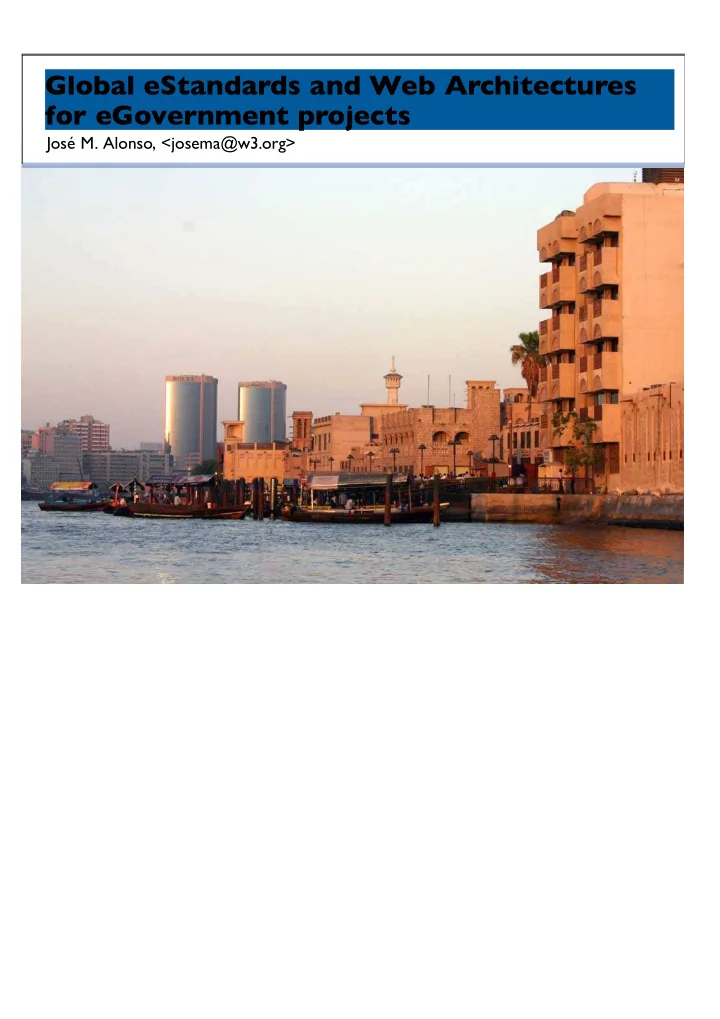

Global eStandards and Web Architectures for eGovernment projects José M. Alonso, <josema@w3.org>
eGovernment and W3C José M. Alonso CTIC Fellow - W3C eGovernment Lead Technology and Society Domain 28 May 2007 These slides: http://www.w3.org/2007/Talks/0528-Dubai-JA/
World Wide Web Consortium (W3C) Mission: Leading the Web to its Full Potential Founded by Web inventor Tim Berners-Lee in 1994, W3C Provides the Vision and the Standards to Lead the Web : From a Web of Documents ... ... toward One Web: of Data and Services on Everything for Everyone
Where's Wally eGov? Don't try too hard, you won't find it... will you?
What is this about? eGovernment "the use of ICTs, and particularly the Internet, as a tool to achieve better government" The Web is the main channel to deliver eGovernment services
Where's Wally eGov? (revisited)
Where's Wally eGov? (et, voilà!)
Where's Wally eGov? (revisited, take two)
Where's Wally eGov? (et, voilà!, take two)
A big picture
Why W3C has been caring? The Web has become the main channel for Governments to deliver electronic Services to citizens Web technologies are playing a crucial role in the relationships between Governments, and between Governments and Industry Use of W3C Technologies in eGov is constantly increasing they've even started to appear in laws all over the world (e.g. WCAG) Govs give more and more importance to consensus building and open standards
W3C and eGov, an old story ... and not only a technical one Platform for Internet Content Selection (PICS) Started in 1996; "originally designed to help parents and teachers control what children access on the Internet, but it also facilitates other uses for labels, including code signing and privacy" Platform for Privacy Preferences (P3P) Started in 1998; "enables Websites to express their privacy practices in a standard format that can be retrieved automatically and interpreted easily by user agents. P3P user agents will allow users to be informed of site practices (in both machine- and human-readable formats) and to automate decision-making based on these practices when appropriate"
Current eGov efforts at W3C Series of discussions to understand better the needs of Government in deploying current Web standards and the directions that future Web standards should take to best address delivery of Government services.
Why Web Standards? Cost Savers Cooperation with the best Web experts - saves consulting costs Share of R&D costs: beyond the resources of a single organization Exchange of ideas an experiences Best specifications due to a broad review Royalty Free Share of testing costs Increase of Benefits Open Standards increase innovation and competition Growth increase due to market trust More Customers trust - not tied to proporietary solutions
Short term plan European Symposium on eGovernment [symposium page, report] Gijón, Spain, 1-2 February 2007 Toward More Transparent Government: Workshop on eGovernment and the Web [workshop page, call for participation] Washington DC, USA, 18-19 June 2007 Several interesting findings so far, let's review the main ones
Best Practices and Methodologies the ability of interoperable frameworks is key to improving efficiencies and increasing the value of IT investments Foundational technologies based on Web standards, together with best practices for deployment, is the focus of the World Wide Web Consortium's work
Semantic Interoperability of Web Architecture Frameworks Lots of initiatives and interoperability frameworks built or in the works, but usually work only in a given context (national, regional...), hard to interoperate between them yet Producing XML does not mean being interoperable Interoperability is not a technical (only) issue Semantic Web approach is powerful, but a few challenges currently perceived: it's not cheap nor easy lack of expertise in the Industry and Governments
Creating a Trust Context for Citizens Privacy and Security are requirements to build trust with citizens to use eGovernment services W3C's work in Web Security will help governments to standardize and provide solutions that citizens can understand clearly and trust
We expect more to come Workshop in DC will try to validate the findings mentioned and about topics not much explored yet, e.g., dissemination of information, long-term doc archival, digital identity... Number of Governments all over the world using W3C techs is constantly increasing IDABC, REDGEALC (OAS), etc. new technologies, old problems, e.g.: mobile phones as enablers of Gov services even in developing countries difficult to build an interoperable solution (too many devices, browsers...), see the Mobile Web Initiative (MWI) work
Conclusions eGovernment Services increasing sophistication, but "good old problems" not solved yet, e.g., interoperability need to explore more to see if those findings are interesting enough for Membership and eGov actors need cooperation and skip reinventing the wheel, e.g., use cases and best practices W3C has a role to play, but we cannot do it alone
Thanks [cover photo: http://www.flickr.com/photos/bohane/221024840/]
Recommend
More recommend